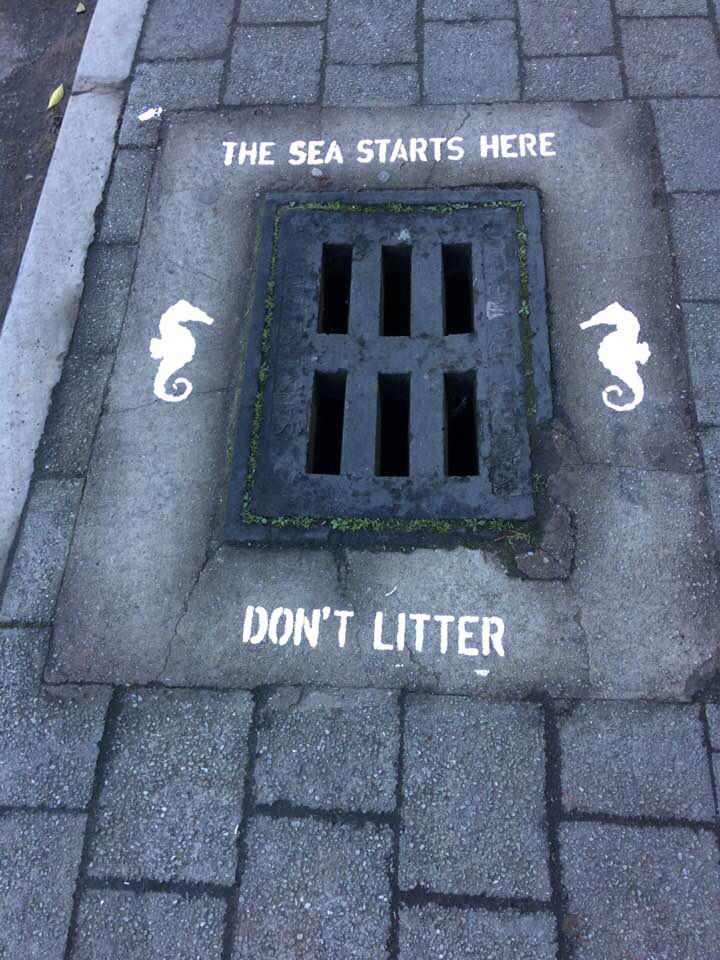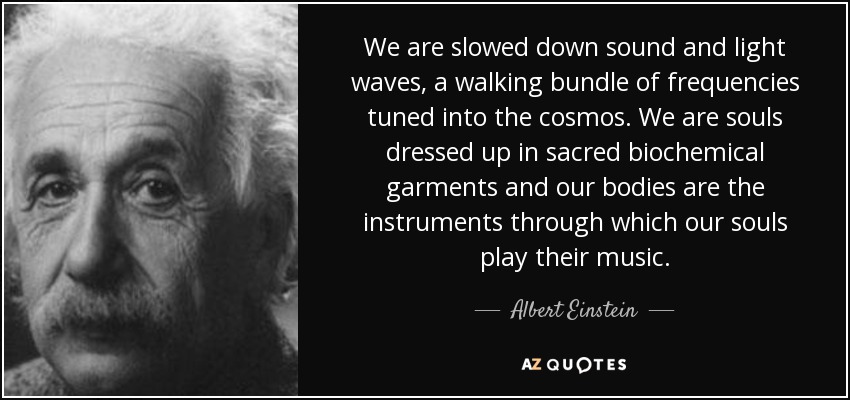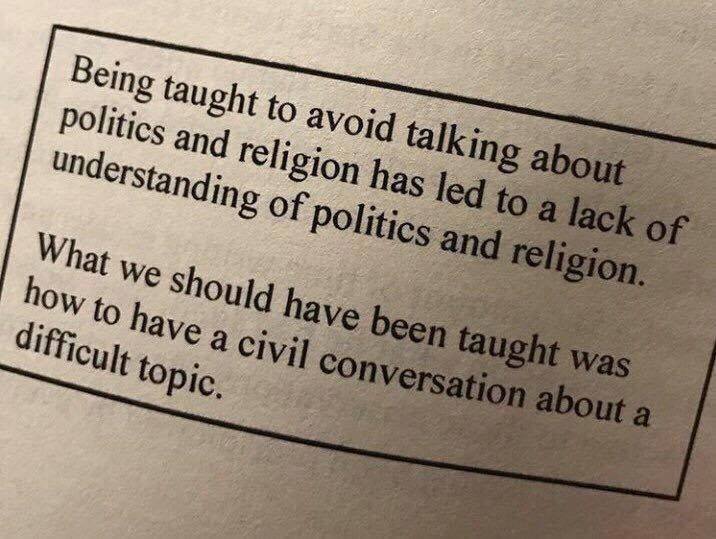
If you don’t think this has anything to do with health, a previous post revealed that due to plastic pollution in our water and food, most people each week eat about a credit card’s weight of plastic!

Tom's Blog on Life and Livingness

If you don’t think this has anything to do with health, a previous post revealed that due to plastic pollution in our water and food, most people each week eat about a credit card’s weight of plastic!

If you want to be fully healthy and alive you must aspire to the ultimate truth – that you are an immortal, indestructible spiritual being that cannot be harmed unless it is with your agreement. Stop being so damned agreeable to being hurt! 🙂
You are not made of energy. You are an energy production unit that creates energy.


I am continually surprised and impressed by how much wisdom and foresight had America’s founding fathers.

Science has shown that musical training can change brain structure and function for the better. It can also improve long-term memory and lead to better brain development for those who start at a young age. Furthermore, musicians tend to be more mentally alert, according to new research from a University of Montreal study.
https://www.inc.com/john-rampton/the-benefits-of-playing-music-help-your-brain-more.html


I marvel at the way elderly couples can walk together with such delicateness that it’s like they’re holding the fate of the world in their hands, even though they know their connection is about to end.
I marvel at the tiny salty thunderstorm of miso in my cup.
I marvel at how birds can fly but we’ve somehow never worshipped them as gods.
I marvel at the sensation of wind buffeting my body as I hang out the clothes, a whirling twirling invisible force cheekily caressing my material form like an ancient eternal lover lifting up my skirt.
I marvel that strangers on the internet are interested in the thoughts in my head, and that I’ve still got things to say after all this time.
I marvel at how goddamn good a shower feels and the fact that I’m allowed to have one whenever I like.
I marvel at how big and old the universe is and how we don’t really know anything about anything but we hardly ever talk about it.
I marvel at the wide-eyed openness of infants and the closely guarded secret every grownup holds about their lifelong struggle to get back there.
I marvel at how we all roar past each other in giant metal speed machines every single day, and it somehow flows with such miraculous smoothness and consistency that we’re always surprised to see anything go wrong with it.
I marvel at quiet housewives and the secrets they’ll never tell.
I marvel at how great tragedies always cut through the muck of cultural and technological alienation and people rush through danger to help perfect strangers as though they are beloved family members.
I marvel at how beautiful young people are and how adept the mind is at hiding that fact from them.
I marvel at how sometimes the intimacy of a private message conversation with a stranger on the other side of the world can surpass that of any face-to-face conversation. Sometimes you hit on a connection so deep that you get the sense that you’re not just speaking to another human but communing energetically with their unblanketed soul. And I marvel that these connections have only just started happening in a mainstream way in the last decade or so, and I wonder what that can mean for us as a species.
I marvel at the tenderness and protectiveness of young men towards old women.
I marvel at how we’re all fleshy, fingery, toothy ape monsters that consume the life force of other organisms with our mouths and excrete them out our anuses, but we still look at some specific humans like they’re weirdos.
I marvel at the way people can talk themselves out of doing what they really want and the sneaky, roundabout way they always end up doing what they want anyway.
I marvel at people who build entire lifestyles around making sure they get to have a few hours a week to spend floating in the ocean and waiting for a wave, just so they can have the occasional experience of riding on a force of nature while standing on two feet.
I marvel at the outcasts and shut-ins who’ve ceased trying to pretend that our society is anything other than bat shit crazy nonsense.
I marvel at the softness of my pillow and how sleep is so healing in such a gentle way that it feels like it must be illegal.
I marvel at the lovely rainbows and tiny crackling of the soap bubbles when I’m doing the dishes.
I marvel at how the power of babbling thought stories is so tenuous that spending an hour outside with a single tree can cause them to fall crumbling away.
I marvel at cake. What dark magic is that? It goes in the oven a sloppy mess and comes out as a puff of intoxicating decadence.
I marvel at the instincts of dogs and children at detecting malevolence.
I marvel at the sound of rain on my roof and how you can zone in and listen to each individual drop or zoom out and listen to the whole symphony.
I marvel at the friendly face of the moon and how she dances perfectly with my monthly cycle.
I marvel at the subtle winking behind the confident-sounding bloviations of pundits and know-it-alls from that deep, primordial place within them which knows it’s total play-acting.
I marvel at how good sand feels to my feet; a free massage from the sea-chewed bones of ancient sea life and prehistoric lava ejaculations.
I marvel at the sweet patience of mothers as they listen and respond to every tiny thought that tumbles out of their toddler’s mouth, no matter how repetitive or purposeless.
I marvel that owls and whales and hummingbirds and giant squids are a thing. They seem like made-up science fiction creatures.
I marvel at the way science tells us that our world is an inseparable swirling sea of microscopic particles and energy, yet we can spend all day thinking about what a bitch our coworker Stephanie is.
I marvel at how self-destructive people can be when they’re scared and how our little tender fears are used to manipulate us, and how really the only thing standing between us and health is a little bit of bravery; just enough courage to step towards the things we are scared of, whether they be homelessness, disappointment, heartache, loneliness, abandonment, or betrayal.
I marvel at how we have pet animals moving around our houses and act like it’s not weird. “I thought I’d bring a small furry mammal into this building to wander around from room to room for a few years.”
I marvel at how, despite all the psychological brutalizing of the social engineers, if you stand a thousand people in a field and play beautiful music, every identity barrier melts away.
I marvel at our ability to stay calm and mature instead of constantly screaming “Holy shit! We’re in space and death happens and I don’t really know what anything is!”
I marvel at how people let doctors knock them unconscious and inflict precise acts of calculated violence upon their bodies with very sharp blades, and how it usually works and makes them healthier.
I marvel at the experience of drinking from a glass of water, chugging huge mouthfuls of this weird flavorless liquified ancient volcano vapor that is welcomed with excitement by every part of my body and being.
I marvel at cloth. How the hell did we come up with that? I’m sitting here in a t-shirt that took thousands of years of technological collaboration to make and I still don’t even understand how a sewing machine works.
I marvel at how adept the mind is at claiming achievements and ideas for the glory of one tiny little thinker-brain when with even a tincture of humility, anyone can see that no idea or innovation is ever created in isolation.
I marvel at how we can control our blinking and our breath whenever we want, yet it’s possible to go all day without noticing either.
I marvel at the way our flesh is wrapped around these hard calcium structures like a tomato plant tied to a stick.
I marvel at how some flowers from the sidewalk in a jar of water can change a whole room.
I marvel at how life finds a way through the cracks in the concrete and the fissures of our worried minds.
I marvel at the fact that there are giant-brained singing leviathans swimming in our planet’s oceans whose mental lives we know nothing about, and the fact that we’re killing them all while looking to the stars for signs of alien life.
I marvel that I’m told I’ve been on this planet for 44 years and yet it still kind of feels like I just got here.
I marvel at how every single person I meet contains a whole universe inside them that is as rich and as complex as the one inside me.
I marvel at how we can be sitting in a whole bus full of human-shaped universes and not be brought to our knees, tears streaming from our face, wonder howling from our being, with the thunderous overwhelming mind-blowing magnificence of that very fact.
I marvel at the fact my body can make humans and the humans it makes turn out to be bloody amazing and way beyond my wildest expectations of how beautiful humans can be.
I marvel at how powerful love is and how when two people sincerely decide to fully love, understand, and champion each other then the whole they create is truly greater than the sum of their parts.
I marvel at the freedom of being seen, finally, after all these years of trying to hide.
I marvel at the healing power of receiving pleasure.
I marvel at the power of having my shameful wounds tended to by the hands of someone who is devoted to loving all of me.
I marvel at how two people turned to face one another at the same frequency can create a deep and abiding peace, like how two speakers emitting a tone of the exact same frequency will cancel each other out when turned to face towards each other.
I marvel at a human’s capacity for falling in love with a bird, a tree, a song, this moment, and I wonder if we were brave enough to fall in love with each other in every moment without falling immediately into the old patterns of possessiveness and manipulation, whether that would be enough to change everything.
I marvel at this wild and crazy ride.
I marvel that it’s still going and might still go on for a long time.
I marvel at you.

Happy 4th of July to my American friends! May you soon come to restore your freedoms, liberty and good will on which your country was founded!